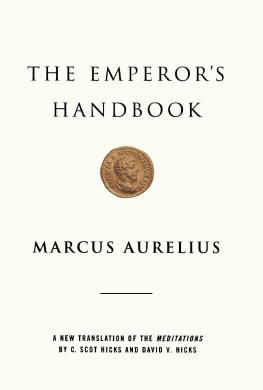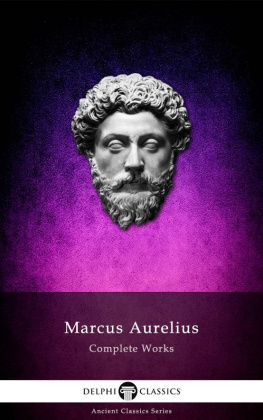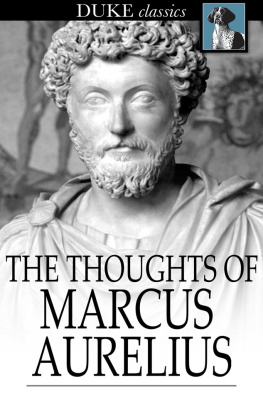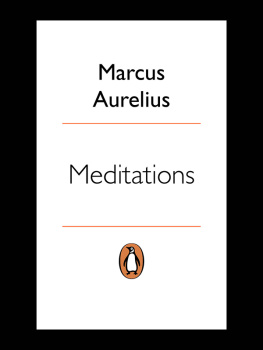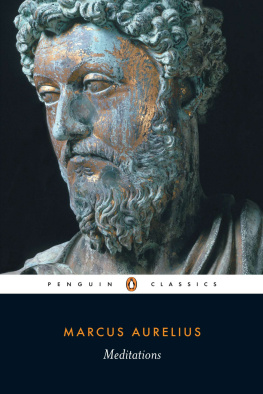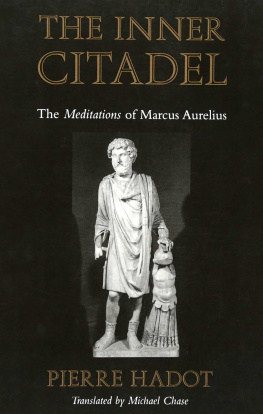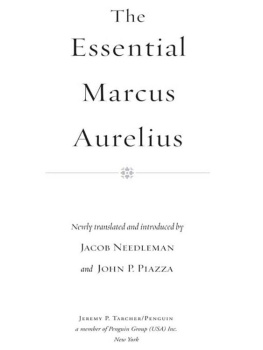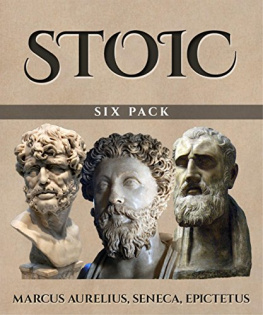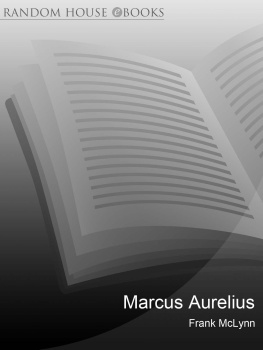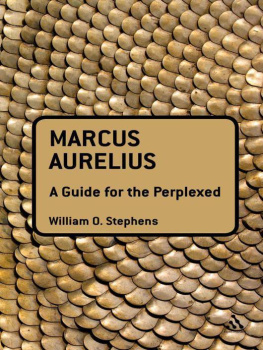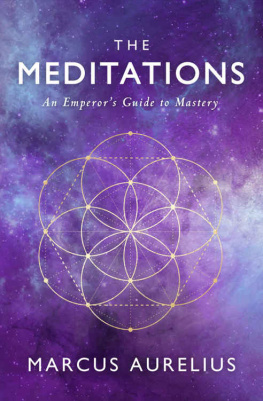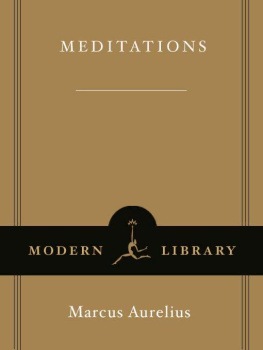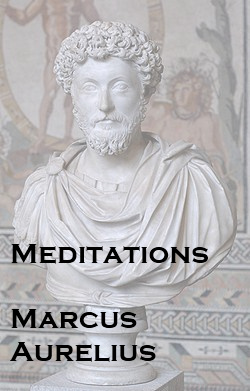INTRODUCTION
The book you are about to read was never intended for publication, whatever that might have meant in the second century. It is often referred to as the Meditations of the Emperor Marcus Aurelius, but in fact it was untitled in antiquity and takes the form of notes intended for personal and private use. How these notes ever got into our hands is one of those tantalizing mysteries that historical novels are made of.
Did the emperor write his notes on fragile papyrus or portable wax tablets? When, under the grueling conditions of camp life on the Roman frontier, did he find time to jot down his thoughts? Was it a daily routine, or whenever he could grab a moment? Or was there a scribe? Might Marcus have dictated such probing and introspective, yet strangely impersonal notes?
When he died, probably from exhaustion after thirteen years of grinding warfare with the Germans, did he leave instructions for the safekeeping of his notes? Did he entrust them to a friend, a relative, a fellow Stoic? Or in the confusion of the moment, were they discovered by a servant and spirited away and later sold for bread? Did the captain of his guard requisition them with everything else on the emperors person at the time of his death and turn them over to the imperial family or a Senate in mourning? And after that, by what circuitous and utterly silent route did they end up in the hands of an aristocratic Byzantine humanist and scholar during the reign of Leo the Wise?
This much we surmise. Sometime before his election as bishop of Caesarea (Cappadocia) in 907, a Byzantine scholar and churchman named Arethas sent a letter to Demetrios, the metropolitan of Heraclea in Pontus, presenting him with what he described as the most useful old book of the Emperor Marcus. All our fourteenth and fifteenth-century manuscripts are thought to derive from this book, or the copy Arethas made of it before giving it away.
What is far clearer is the progress of Marcus Aurelius book since the Renaissance. The attentions of humanists after the fall of Byzantium, of scholars Meric Casaubon (who made the first English translation) and Thomas Gataker (who created the chapter divisions still in use) in the seventeenth century, of essayist Matthew Arnold and historian Ernst Renan in the nineteenth century, and of statesmen and scholars in the twentieth century have ensured for Marcus words a profound and worldwide influence. In our own time, public figures as far apart on the political spectrum as Admiral James Stockdale and President Bill Clinton have praised the emperors book, and the historian Michael Grant has called it one of the most acute and sophisticated pieces of ancient writing that exists and, incidentally, the best book ever written by a major ruler.
T HE P URPOSE OF T HIS B OOK
At the end of the tenth century, a Byzantine lexicon known as the Souda cited several passages from a work by Marcus the philosopher-king organized in twelve books and described as the regimen of his personal life. We have not tampered with this arrangement. Except for the first book, which may have been written last and reads like an authors acknowledgments, all the books are alike. There is no beginning, middle, or ending. The reader can pick up and start anywhere, and thoughts that appear in the second book will reappear in different garb in later books. This pattern is consistent with the observation that we need more often to be reminded than informed.
From notes inserted between the first and second and between the second and third books, it appears that Marcus wrote The Emperors Handbook during the last years of his life while camped with his army along the frozen marshes of the Danube. Yet this is not a diary. Marcus almost never refers to what is happening in camp or in the rest of the empire. He is concerned exclusivelywith his own thoughts, although not in a systematic or speculative way. This is not a philosophical treatise. Marcus thoughts appear to emerge from an inner dialogue that is as relentless as it is rooted in the loamy soil of daily life.
The arrangement and content of The Emperors Handbook suggest that it was written as a series of thought exercises consistent with a discipline encouraged by Stoics like Seneca and Epictetus, and out of which later grew the Christian practice of spiritual exercises. Marcus labored over the expression of his thoughts and gave them many forms. Sometimes he records them as a dialogue with himself; sometimes he poses a question or berates himself; sometimes he tells a joke or quotes something he has read; but always, he is reminding himself of a Stoic precept that will help him act reasonably and in harmony with nature. Whether creating or copying, he is like a carpenter working a fine piece of furniture. Each piece needs not only to serve a purpose, but to do so boldly, beautifully, memorably. This accounts for the striking and often aphoristic way Marcus addresses himself.
Know that in time those things toward which we move come to be. (VI.50) Bear in mind that the measure of a man is the worth of the things he cares about. (VII.3) Leave the wrong with the person who did it. (VII.29)
Through regular mental exercise of this sort, Marcus sought to furnish his mind with true, good, and beautiful things. Someone with a mind so furnished, he believed, must do true, good, and beautiful things, since action follows thought. Your mind, he wrote (V.16), is colored by the thoughts it feeds upon, for the mind is dyed by ideas and imaginings. Saturate your mind, then, with a succession of ideas like these... and he proceeds to remind himself of the ideas that will make it possible for him to live in a palace in the right way. As important as the form of his ideas is their usefulness. They are, after all, furniture.
When your spirits need a lift, think of the virtues and talents of those around youones energy, anothers modesty, the generosity of a third, something else in a fourth. Nothing is so inspiring or uplifting as the sight of these splendid qualities in our friends. Keep them always in mind. (VI.48)
Everything about The Emperors Handbook suggests that Marcus used it to remind himself of his guiding principles and to hold himself accountable to them. These are not merely thoughts recollected in tranquility, but they contain the landmarks and lighthouses by which he navigated a life, the life not of a saintly recluse, but of a general, administrator, legislator, husband, father, and judge besieged on all sides. For this reason, we have titled his notes a handbook and have taken the liberty allowed by a modern translation of an ancient text (designed for oral rather than visual presentation) to highlight some of Marcus more memorable and apt aphorisms.
Like thousands of other English-speaking people who are reasonably well educated, we have enjoyed reading Marcus over the years and marveled at the ability of someone so far removed from us in language, time, culture, creed, and station in life to know so much about us and to offer such pertinent advice. At the same time, we wondered at the awkwardness of his English translators and knew enough Greek to know that his Greek was not that bad, although some have claimed it was. We resolved to rectify this situation, and in the process, we hoped to make the provocative wisdom of this extraordinary man available to a wider audience. It is fine for scholars to study Marcus, but it is natural for the captains of industries and armies to carry him in their briefcases, for this was a man of action, not merely of words, and the few words he wrote to himself were meant to incite actions, not dissertations.
I TS U P TO Y OU!
Scholars interested in Marcus ideas typically argue over whether he is a consistent Stoic and criticize him for being unoriginal or unsystematic in his thinking. But their debate largely misses the point. Marcus has little interest in ideas for their own sake. He wants ideas that prove their usefulness in helping him to live a happier, more purposeful and productive life. He constantly cautions himself to disregard ideas that are indifferent, that are of no practical, moral, or social benefit. This does not mean that he disregards poetry and physics, religion and the arts. It means he bores into these subjects to extract and apply their meanings to the question of how to live and manage the affairs of the empire.
Next page
